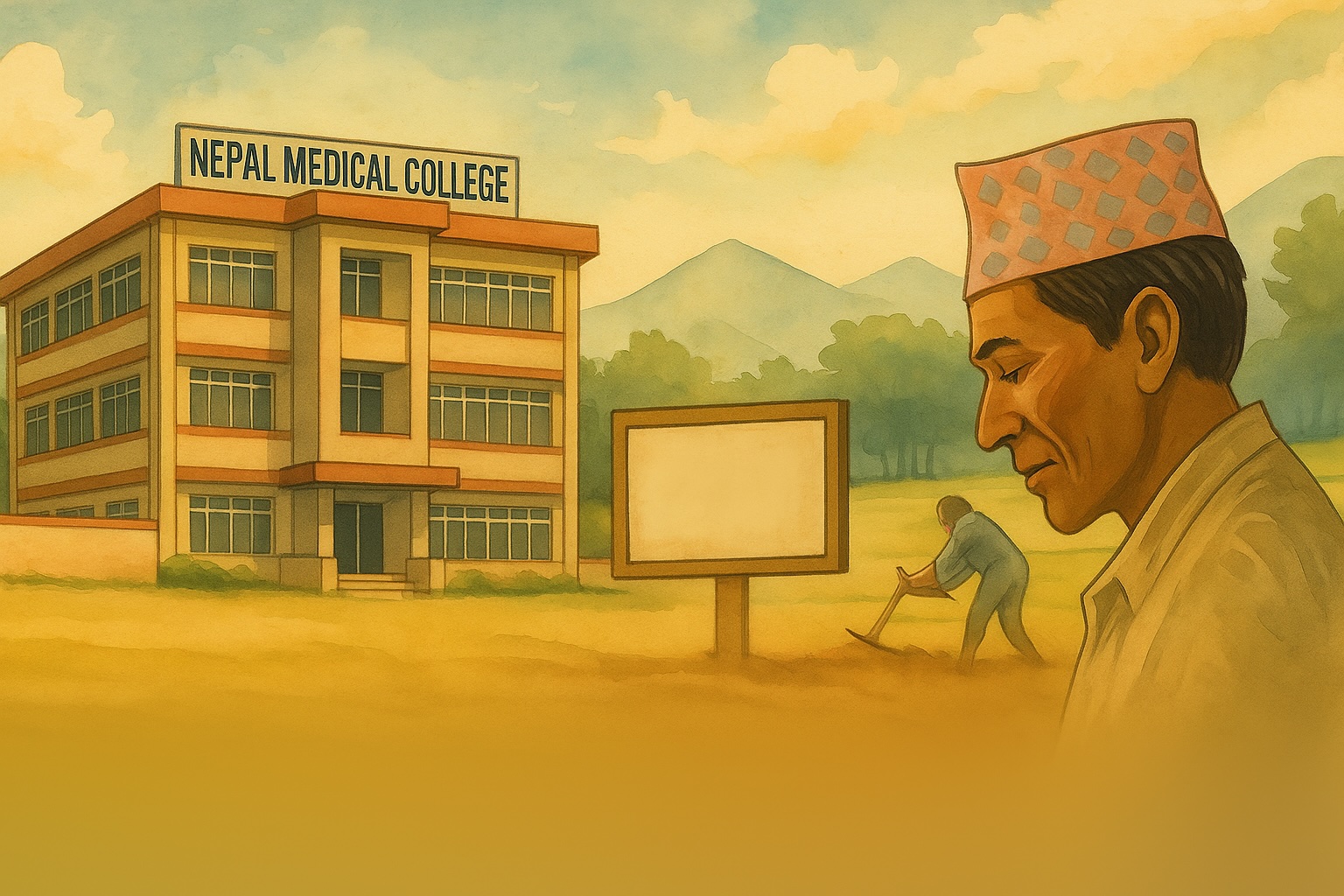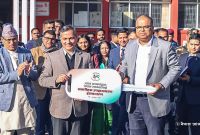Collapse of Credibility: Inside Nepal Medical College’s Web of Controversy

Kathmandu — Nepal Medical College (NMC), once hailed as a cornerstone of medical education in Nepal, now finds itself ensnared in mounting controversies ranging from land disputes and regulatory evasion to institutional misconduct and threats against the press. In recent weeks, this once-prestigious institution has witnessed growing scrutiny from the media, civil society, and even regulatory bodies. Despite official rebuttals from the NMC administration, critical questions remain unanswered, casting a long shadow over the college's integrity.
Land Disputes and Supreme Court’s Landmark Ruling
Much of the recent spotlight stems from a Supreme Court verdict affirming Guthi Sansthan’s ownership over a 17-ropani land parcel adjacent to Nepal Medical College. Although this ruling does not directly pertain to the 42-ropani land currently in dispute between NMC and Guthi Sansthan, both plots fall under Guthi ownership — a fact that raises the possibility of further legal complications for NMC.
Hari Prasad Subedi, spokesperson for Guthi Sansthan, confirmed that the verdict has been implemented through a formal request to the Land Revenue Office to transfer the land title (lalpurja) to the institution. “We expect to receive the lalpurja within days,” he stated. This legal victory has emboldened Guthi Sansthan in its ongoing legal fight over the 42-ropani land currently occupied by NMC, raising public and legal attention toward alleged encroachment by the medical college.
Workplace Intimidation and Allegations of Discrimination
Within the institution, a culture of fear appears to be festering. Multiple anonymous sources—including nurses, guards, and department heads—describe NMC’s work environment as hierarchical, intimidating, and ethically troubling. Particular focus has centered on Matron Nabina Singh, who, according to staff testimonies, operates with unchecked authority. Allegations include verbal abuse, discriminatory behavior toward certain ethnic groups, and preferential treatment based on personal affiliations.
Moreover, concerns over Singh’s professional qualifications have surfaced. While she reportedly holds a Master’s in Nursing from Dehradun, India, her degree lacks official equivalency recognition from the Nepal Nursing Council. As per Nepal’s Nursing Council Act 2052, practicing without registration or equivalency is a punishable offense, carrying potential imprisonment up to three years or a fine of up to NPR 30,000. The Council has remained publicly silent on this issue, intensifying speculation and concern.
Administrative Evasion and TikTok Silence
Amid escalating scrutiny, NMC’s Director, Dr. Nilmani Upadhyay, came under fire for issuing what was perceived as a veiled threat to the editor of Nepal Aaja, a news portal that has published multiple investigative pieces on the college. “Correct it in your news otherwise it will land in trouble,” he wrote via WhatsApp — a message widely criticized as coercive and unprofessional.
Shortly after Nepal Aaja reported on his online behavior, Dr. Upadhyay deactivated his TikTok account, which had previously featured content deemed inappropriate in light of the unfolding institutional crisis. While the move is seen by many as a form of accountability, critics argue it is too little, too late.
Official Response: A Hollow Rebuttal?
In an official letter signed by Senior HR Officer Hari Prasad Tripathi, NMC denied all allegations and labeled the reports as “baseless, misleading, and defamatory.” The college claimed to be in full compliance with labor laws and committed to ethical conduct. However, the response failed to address specific accusations — such as forced resignations, low faculty salaries, and alleged financial irregularities related to inspection processes.
Notably absent was any reference to Guthi land encroachment or the question of Matron Singh’s licensing status.
Political Influence and Public Intimidation
The controversy deepened when a self-proclaimed political activist reportedly threatened Nepal Aaja, stating, “We are ready to fight or die. Don’t write about Nilmani sir.” This further stoked fears that political connections may be shielding unethical practices within NMC. The involvement of partisan elements threatens not just press freedom, but the very fabric of accountability in higher education.
Institutional Accountability at Stake
As of today, Nepal Medical College’s administration has failed to provide concrete documentation verifying key personnel licenses, land ownership claims, or rebuttals to verified testimonies. Regulatory agencies, including the Medical Education Commission and Kathmandu University, have yet to take a public stance — though multiple insiders suggest that private inquiries have already begun.
The failure to address these critical concerns is not merely an internal matter. It jeopardizes the credibility of Nepal’s broader medical education system.
Editorial Note: Upholding Integrity
This cover story is based on verified documents, eyewitness testimonies, and official statements. Nepal Aaja remains committed to fair and balanced reporting. Should Nepal Medical College or any concerned parties wish to issue clarifications or rebuttals, we pledge to publish their responses in full.
As the public’s right to truth collides with opaque institutional practices, one truth remains: sunlight is the best disinfectant. And Nepal Medical College must open its doors to scrutiny — or risk permanently closing them to trust.
Nepal Medical College




![From Kathmandu to the World: How Excel Students Are Winning Big [Admission Open]](https://nepalaaja.com/index.php/img/70194/medium/excel-college-info-eng-nep-2342.jpg)


